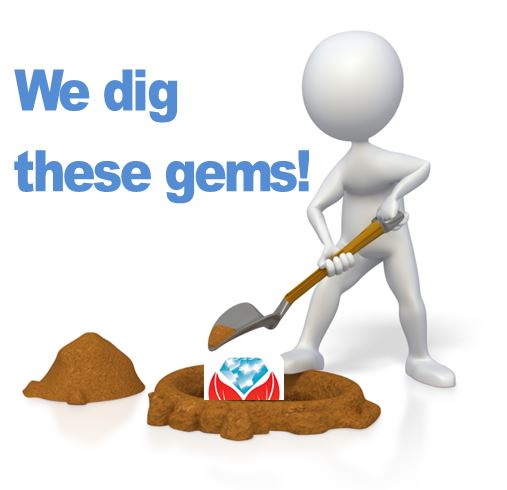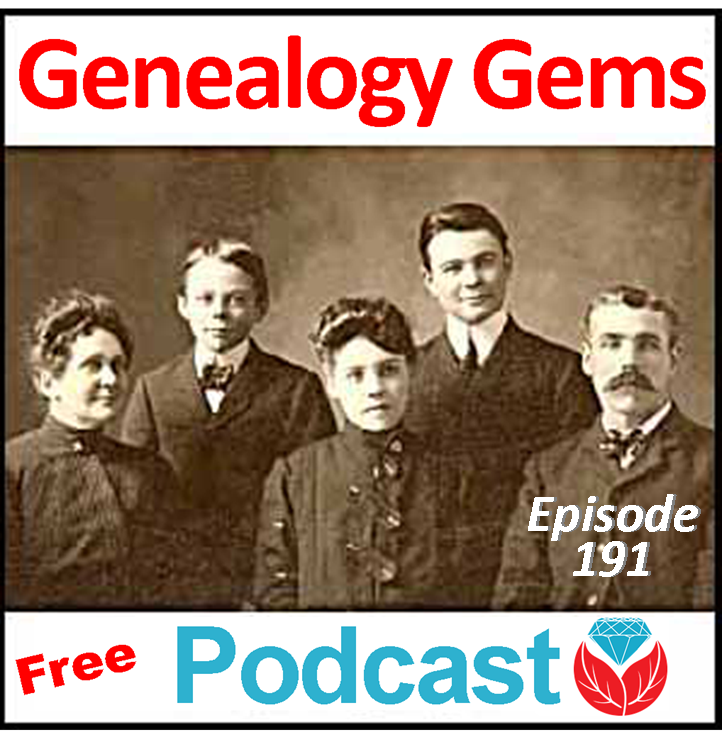Blog


We Dig These Gems! New Genealogy Records Online
 Here’s this week’s roundup of new genealogy records online. Highlights: Canadian marriages, German emigrants, Philippines civil registrations, Russian and Ukrainian church records and Michigan marriages.
Here’s this week’s roundup of new genealogy records online. Highlights: Canadian marriages, German emigrants, Philippines civil registrations, Russian and Ukrainian church records and Michigan marriages.
CANADA – MARRIAGES. A new collection of district marriage register images for Ontario, Canada (1801-1858) is now free to browse at FamilySearch.org. Most entries are for the 1830s-1850s.
GERMANY – EMIGRANTS. The (former) Grand Duchy of Oldenburg Emigrants database just passed the 100.000 person mark. According to a note from the site host, “The database contains beside the emigrant itself also the family members we could trace in Germany or the Country to which he migrated.” Learn more at this blog post from the Oldenburgische Gesellschaft für Familienkunde. Click here to hear online German records expert Jim Beidler talk about new German records online.
PHILIPPINES – CIVIL REGISTRATIONS. FamilySearch.org has added 1.7 million+ browsable records to an existing collection of Philippines national civil registration records (1945-1984). These are described as “marriage and death certificates from various localities,” excluding Manila, for which there is a separate database.
RUSSIA – CHURCH. Nearly half a million browsable records have been added to a free FamilySearch.org collection of church books for Tatarstan, Russia (1721-1939). These are described as “images of births and baptisms, marriages, deaths and burials performed by priests of the Russian Orthodox Church in the republic of Tatarstan.” More records are being added as they are available.
UKRAINE – CHURCH. Another 205,000 browsable records have been added to a free FamilySearch.org collection of church book duplicates for Kyiv, Ukraine (1734-1920).
U.S. – MICHIGAN – MARRIAGES. FamilySearch.org has added more than 60,000 indexed names to its collection of Michigan county marriage records (1820-1940) and another 2000+ names to its collection of Michigan church marriage records (1865-1931).
 Thanks for sharing this post about new genealogy records online with your genealogy buddies on your favorite social media sites! We love spreading good news.
Thanks for sharing this post about new genealogy records online with your genealogy buddies on your favorite social media sites! We love spreading good news.

Free Genealogy Gems Podcast Episode 191

The free Genealogy Gems Podcast episode 191 has been published. You’ll hear German genealogy records online, best apps for local history, Google research success stories and MORE!
I’m pleased to announce that the free Genealogy Gems podcast episode 191 is now published and available for your listening pleasure.
My favorite segments of the show are host and producer Lisa Louise Cooke’s conversations she had on the road at recent conferences with two genealogy experts:
 First, you’ll hear from German expert Jim Beidler about some of the new German resources coming online and how to use them. I love his tips for understanding the difference between the types of records you’ll find, like original church records versus duplicates, abstracts or transcripts.
First, you’ll hear from German expert Jim Beidler about some of the new German resources coming online and how to use them. I love his tips for understanding the difference between the types of records you’ll find, like original church records versus duplicates, abstracts or transcripts.
 Then you’ll hear Lisa’s conversation with Amy Crow from RootsTech. It’s fun to hear them get excited about genealogy apps they love! Amy shares four favorite apps for local history. Don’t miss these! Some were totally new to me.
Then you’ll hear Lisa’s conversation with Amy Crow from RootsTech. It’s fun to hear them get excited about genealogy apps they love! Amy shares four favorite apps for local history. Don’t miss these! Some were totally new to me.
More highlights from this episode include:
- An inspiring Google research success story from an inspiring young family historian;
- Tips on organizing Evernote notebooks;
- A big new update from AncestryDNA with Diahan Southard;
- Thoughts on The Summer Before the War with Sunny Morton;
- Upcoming Canadian genealogy conferences;
- Lisa’s next live-streaming sessions and other genealogy news.
Click here to listen to the Genealogy Gems podcast episode 191. OR….
 Click here to get the Genealogy Gems app. In addition to how easy it is to listen, Genealogy Gems app users get access to unique BONUS content in several episodes. Bonus content for this episode: an extra segment about several National Archives websites, with a spotlight on the U.S. and mention of sites for Canada, the U.K., and Australia.
Click here to get the Genealogy Gems app. In addition to how easy it is to listen, Genealogy Gems app users get access to unique BONUS content in several episodes. Bonus content for this episode: an extra segment about several National Archives websites, with a spotlight on the U.S. and mention of sites for Canada, the U.K., and Australia.

Discover Your House History: “If These Walls Could Speak”
 A “house history” can tell you more about the house you live in–or your ancestor’s home. Here’s how.
A “house history” can tell you more about the house you live in–or your ancestor’s home. Here’s how.
Are you curious about the history of the house you live in, or would you like to trace the history of a family property? The online article “How to Research Your Home’s Past” by Charity Vogel has some great ideas. It’s not written for family historians, but I like some of the ideas it suggests:
1. Pull a full history of home ownership off your deed. (Historical deeds may not have these. But each deed does represent a link in the chain of property ownership: you should be able to move forward and backward in time in deed records until you’ve listed all owners.)
2. Use census records to learn more about other folks who lived in your home. Remember you’ll be able to see how many people lived there, and, for some census years, whether they owned or rented.
3. Watch for unusual patterns of ownership. For example, a deed showed sisters co-owning a home in the 1930s. Additional research showed that the sisters were nurses and ran the house as a community hospital. How cool is that to know about a house?
4. If it was a grand or unusual home, see whether the newspapers covered its construction. The author of the article found an 1898 article that detailed the entire five-month building process of her house!
Last year I shared an applicable research strategy in my blog post A Shocking Family Secret, and 3 Powerful Newspaper Research Tips about researching our ancestors and where they lived. By searching on their home address, and not including their name, you can uncover “a kind of house history set of search results, revealing who lived there before, descriptions of the home and its contents and who moved in after your ancestors left. In my case, I located an article about the Cooke home (by the address) being up for sale several years before they owned it. That article included a fairly detailed description of the property. The final article found in the British newspapers was also found only by address (as the Cooke name wasn’t mentioned) and it detailed the contents of their household up for sale. The auction was held in preparation for their move to Canada.” (Click here to learn more about finding your family history in newspapers.)
While looking for more on this topic, I came across a great newspaper article about three researchers who specialize in house histories. They said that in addition to the personal satisfaction of knowing about a family home, “A bit of history and story makes it much easier to sell: it attracts a certain buyer.”
Here are a few more helpful resources, if you’d like to research your house history:
The New England House Historian: An inspiring and informative blog by house historian Marian Pierre-Louis, who works in New England. For example, read this great post: “Top 10 Places to Find Old Photos of Your House.” Scroll through the entire blog, though. It’s really inspiring!
- Discovering the History of Your House and Your Neighborhood
by Betsy Green
- House Histories: A Guide to Tracing the Genealogy of Your Home
by Sally Light
 More House History Gems: Researching a Family Residence
More House History Gems: Researching a Family Residence
Ancestral Landmark Discovery with Google Earth
How to Find a Family Address: 4 Steps to Using Google Earth for Genealogy




